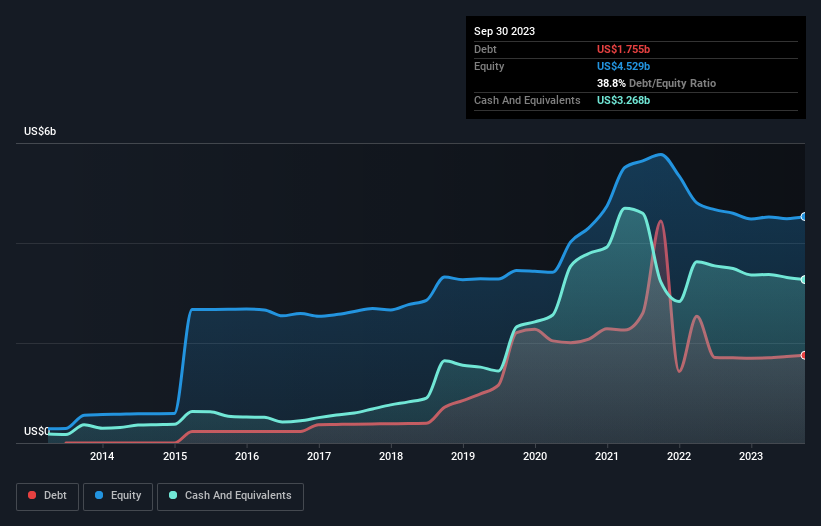- United States
- /
- Real Estate
- /
- NasdaqGS:ZG
Health Check: How Prudently Does Zillow Group (NASDAQ:ZG) Use Debt?

Some say volatility, rather than debt, is the best way to think about risk as an investor, but Warren Buffett famously said that 'Volatility is far from synonymous with risk.' So it seems the smart money knows that debt - which is usually involved in bankruptcies - is a very important factor, when you assess how risky a company is. Importantly, Zillow Group, Inc. (NASDAQ:ZG) does carry debt. But should shareholders be worried about its use of debt?
When Is Debt Dangerous?
Debt assists a business until the business has trouble paying it off, either with new capital or with free cash flow. If things get really bad, the lenders can take control of the business. However, a more usual (but still expensive) situation is where a company must dilute shareholders at a cheap share price simply to get debt under control. Having said that, the most common situation is where a company manages its debt reasonably well - and to its own advantage. The first thing to do when considering how much debt a business uses is to look at its cash and debt together.
See our latest analysis for Zillow Group
How Much Debt Does Zillow Group Carry?
As you can see below, Zillow Group had US$1.76b of debt, at September 2023, which is about the same as the year before. You can click the chart for greater detail. However, its balance sheet shows it holds US$3.27b in cash, so it actually has US$1.51b net cash.

How Healthy Is Zillow Group's Balance Sheet?
Zooming in on the latest balance sheet data, we can see that Zillow Group had liabilities of US$941.0m due within 12 months and liabilities of US$1.19b due beyond that. Offsetting these obligations, it had cash of US$3.27b as well as receivables valued at US$97.0m due within 12 months. So it actually has US$1.24b more liquid assets than total liabilities.
This short term liquidity is a sign that Zillow Group could probably pay off its debt with ease, as its balance sheet is far from stretched. Simply put, the fact that Zillow Group has more cash than debt is arguably a good indication that it can manage its debt safely. When analysing debt levels, the balance sheet is the obvious place to start. But ultimately the future profitability of the business will decide if Zillow Group can strengthen its balance sheet over time. So if you want to see what the professionals think, you might find this free report on analyst profit forecasts to be interesting.
In the last year Zillow Group had a loss before interest and tax, and actually shrunk its revenue by 7.4%, to US$1.9b. We would much prefer see growth.
So How Risky Is Zillow Group?
While Zillow Group lost money on an earnings before interest and tax (EBIT) level, it actually generated positive free cash flow US$191m. So taking that on face value, and considering the net cash situation, we don't think that the stock is too risky in the near term. With mediocre revenue growth in the last year, we're don't find the investment opportunity particularly compelling. There's no doubt that we learn most about debt from the balance sheet. However, not all investment risk resides within the balance sheet - far from it. Be aware that Zillow Group is showing 1 warning sign in our investment analysis , you should know about...
If, after all that, you're more interested in a fast growing company with a rock-solid balance sheet, then check out our list of net cash growth stocks without delay.
Valuation is complex, but we're here to simplify it.
Discover if Zillow Group might be undervalued or overvalued with our detailed analysis, featuring fair value estimates, potential risks, dividends, insider trades, and its financial condition.
Access Free AnalysisHave feedback on this article? Concerned about the content? Get in touch with us directly. Alternatively, email editorial-team (at) simplywallst.com.
This article by Simply Wall St is general in nature. We provide commentary based on historical data and analyst forecasts only using an unbiased methodology and our articles are not intended to be financial advice. It does not constitute a recommendation to buy or sell any stock, and does not take account of your objectives, or your financial situation. We aim to bring you long-term focused analysis driven by fundamental data. Note that our analysis may not factor in the latest price-sensitive company announcements or qualitative material. Simply Wall St has no position in any stocks mentioned.
About NasdaqGS:ZG
Zillow Group
Operates real estate brands in mobile applications and Websites in the United States.
Flawless balance sheet with reasonable growth potential.


